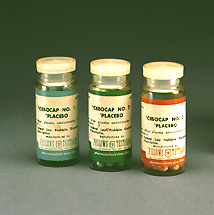Scientists have found that workings of the placebo effect in some people is down to genetics.
 Writing in the Journal of Neuroscience Uppsala University researcher Thomas Furmark explains how he and his colleagues recruited 25 anxiety-prone people with social phobias. The volunteers were asked to deliver a speech (something their social phobia made it hard for them to do), then given eight weeks of treatment with a drug that they were told would improve their symptoms.
Writing in the Journal of Neuroscience Uppsala University researcher Thomas Furmark explains how he and his colleagues recruited 25 anxiety-prone people with social phobias. The volunteers were asked to deliver a speech (something their social phobia made it hard for them to do), then given eight weeks of treatment with a drug that they were told would improve their symptoms.
In fact, unbeknown to the participants, the "drug" was nothing more than just a placebo. At the end of the treatment period the volunteers repeated the public speaking task and, remarkably, the symptoms of ten of them had improved markedly.
To explore the biochemical basis of the result the team screened the volunteers for variants of a gene called tryptophan hydroxylase-2 (TPH-2), which is responsible for producing the neurotransmitter chemical serotonin. Eight of the ten improvers, but none of the other participants, carried a specific form of the TPH-2 gene known as the G-variant. Also, brain scans conducted before and after treatment showed that activity in the amygdala, a part of the brain that encodes fear responses, had dropped in the successfully-treated group.
This result shows that, at least for emotional stresses, certain genes predispose to a greater or lesser response to placebo treatment. But whether this extends to other neurological systems beyond just emotion remains to be seen.










Comments
Add a comment